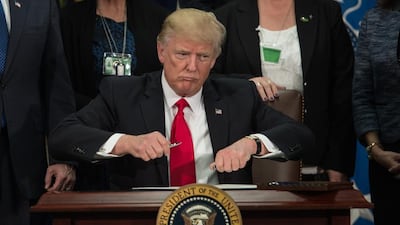NEW YORK // Donald Trump wants to establish safe areas in Syria or surrounding countries to protect fleeing civilians as part of his measures to prevent refugees arriving in the US, according to the draft of an executive order the president is expected to sign this week.
The leaked document offers no further details other than to call on the Pentagon and department of defence to develop a plan for safe zones within 90 days.
The proposal was met with mixed reaction on Thursday, with Qatar welcoming the move but Russia expressing caution.
Such a measure was resisted by Barack Obama and risks dragging the US further into Syria's complex civil war and a confrontation with Russia.
Mr Trump discussed the idea during an interview with ABC News on Wednesday.
"We have enough problems," he said. "Now I'll absolutely do safe zones in Syria for the people. I think that Europe has made a tremendous mistake by allowing these millions of people to go into Germany and various other countries."
For its part, Moscow, an ally of Syrian president Bashar Al Assad, sounded a note of warning.
Dmitry Peskov, a spokesman for president Vladimir Putin, said Russia had not been consulted and that it was important to "weigh all possible consequences".
"It's important not to exacerbate the situation with refugees," he said.
But the idea was welcomed in Qatar, which along with Saudi Arabia, Turkey and western nations is backing rebels fighting Mr Al Assad.
Qatar's foreign ministry director of information, Ahmed Al Rumaihi "emphasised the need to provide safe havens in Syria and to impose no-fly zones to ensure the safety of civilians", according to the state news agency QNA.
The draft executive order also details plans to indefinitely bar Syrian refugees from arriving in the US and temporarily block all other refugee arrivals.
The administration says such sweeping measures are needed to protect Americans from the threat of terrorism but critics say they target Muslims and will make the US less safe.
Hilary Weaver, director of the Immigrant and Refugee Institute at the University of Buffalo, said the proposals would feed terrorist ideologies.
"We shouldn't fall into the trap of thinking that danger lies in a particular group of people," she said. "When we do that sort of profiling, that act of grouping and stereotyping is exactly what will create hate and lead it to increase."
Mr Trump signed two executive orders on Wednesday, kick-starting construction of his border wall with Mexico and removing federal funding from "sanctuary cities" which protect illegal immigrants from deportation. He has yet to announce his plans for dealing with refugees. However, the leaked draft suggests he will suspend entry of all refugees for 120 days.
He also plans to bar immigrants from Syria, Sudan, Somalia, Iran, Iraq, Libya and Yemen for at least 30 days while stricter, permanent regulations are formulated. Mr Trump also wants to slash the number of refugees allowed to enter the US this year from Barack Obama's target of 110,000 to 50,000.
The draft says Syrian nationals could stay in safe zones until they can be safely sent home or resettled in another country.
Although similar proposals were pushed at one time by Hillary Clinton, critics warn that they require an escalation of US or allied air power to defend "no-fly zones" and could spark a confrontation with Russian forces backing the regime.
The proposals sparked an outcry in the US, particularly in cities that did not vote for Mr Trump, with hundreds of people protesting in New York on Wednesday evening.
"Trump: You're wrong, Muslims make America strong," they chanted as darkness fell in Washington Square Park.
Fadumo Osman, a student at New York University, said her parents had arrived from Somalia as refugees. She now worried that other people fleeing violence would not be able to follow or that students would be force to leave after their visas expired. "I feel like this is just the beginning," she said.
The draft does not single out any one religion but it fits Mr Trump's campaign rhetoric of making it harder for Muslims to enter the country. It also prioritises the entry of individuals facing religious persecution, effectively putting Christians living in Muslim countries to the front of the queue.
Lydia Valasquez, congresswoman for New York, called for unity.
"We reject policies that turn our backs on people who have already suffered so much. Each one of us have seen the pictures of the children in Aleppo, the children running with fear in Central America," she said.
"So we are here to say to our Muslim brothers and sisters, tonight, today and in the future, I too am Muslim and we will fight together.
Taking back control of America's borders was one of the key themes of Mr Trump's unconventional candidacy.
His robust stance on immigrants is one of the driving forces of his populist team.
A number of celebrities have said they will register as Muslims if Mr Trump creates a Muslim register, as he threatened during the campaign.
— Madeleine Albright (@madeleine) January 25, 2017
Madeline Albright, the former secretary of state, said she wanted to show her support.
“I was raised Catholic, became Episcopalian & found out later my family was Jewish. I stand ready to register as Muslim in solidarity,” she tweeted.
foreign.desk@thenational.ae

